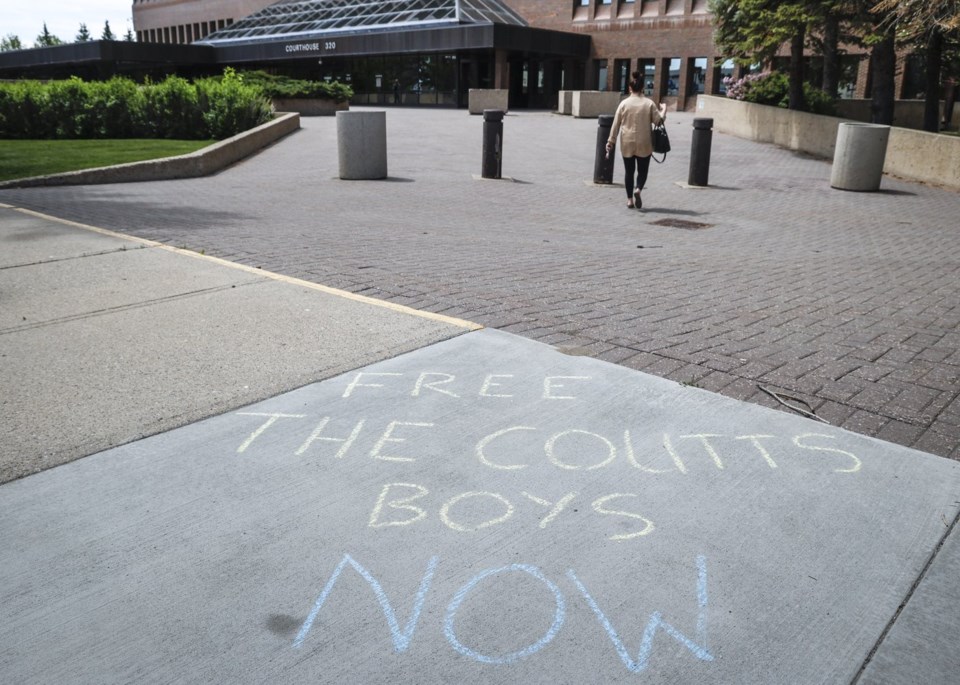LETHBRIDGE, Alta. — A Crown prosecutor says two men on trial over the border blockade at Coutts, Alta., conspired to kill police officers and believed they were justified in doing so.
"They planned and prepared for what they believed would be an inevitable, violent event,” Matt Dalidowicz told jurors in his opening statement Thursday.
“They believed in their own minds that they had the right to act violently in response to police enforcing the law to end the blockade.
"They saw this as their ground zero."
Anthony Olienick and Chris Carbert are on trial charged with conspiracy to commit murder at the protest in early 2022.
They were arrested after RCMP found a cache of guns, body armour and ammunition in trailers.
The blockade paralyzed traffic at the busy Canada-United States border crossing for two weeks amid broader protests over what some perceived as unfair and unnecessary government restrictions and vaccine mandates in the fight against COVID-19.
Dalidowicz told jurors that police were faced with a challenging situation when the blockade began that January.
Officers talked with protest leaders but learned more through undercover officers, he said.
"Police discovered a group within the blockade that was planning something much more sinister than merely blocking the border," Dalidowicz said, his lectern turned to face the jurors.
"They discovered they were no longer simply dealing with a mere protest. They discovered a plot to kill police officers, if police enforced the law to end the blockade."
The accused are also charged with mischief and possession of a weapon for a dangerous purpose. Olienick faces a further charge of being in possession of a pipe bomb.
Dalidowicz said jurors will hear wiretap and weapons evidence tied to Olienick and Carbert.
"Planning and preparation prove the plot to kill police officers," he said.
Prosecutors plan to call 23 witnesses, most of them Mounties.
The blockade made national headlines and polarized opinion at the time.
Inside the courtroom, there were about 50 supporters of the accused.
Outside court, there were two chalk messages scrawled on the sidewalk. One said, Free the Coutts Boys. The other: Justice for Tony + Chris. Free Them Now.
Echoes of the divisive national debate were apparent last week when lawyers on both sides challenged some potential jurors from sitting on the panel.
Justice David Labrenz told lawyers it would be difficult to find jurors not familiar with the case and those who promise to remain impartial should be taken at their word.
That trust didn’t extend to one potential juror, who was dismissed after showing up for jury selection with a picture of the accused on his T-shirt.
Fourteen jurors – five men and nine women – are hearing evidence in the trial and two are to be dismissed before deliberations begin.
Two additional jurors were sent home earlier Thursday, including one who told court her sister’s boyfriend was a cellmate of one of the accused.
The first witness was RCMP Sgt. Greg Tulloch, who along with his partner arrived Feb. 1, 2022, to spell off two other officers tasked with communicating with the protesters.
Tulloch said he didn't speak to either of the accused but did give a warning to protesters that police were planning to take action. He said he addressed the crowd at Smugglers Saloon, a local gathering spot for the convoy members, and told them it was time to leave.
"The intent was to direct everybody who had the responsibility for the control of a vehicle to go out to the highway and move it," Tulloch said.
"If the people who were in control of the vehicles would not take the vehicles on their own, then the RCMP would begin taking action to remove the vehicles and people associated with them.
"They were not interested in doing what I suggested. It was very clear they were not going to be removing their vehicles."
This report by The Canadian Press was first published June 6, 2024.
Bill Graveland, The Canadian Press




